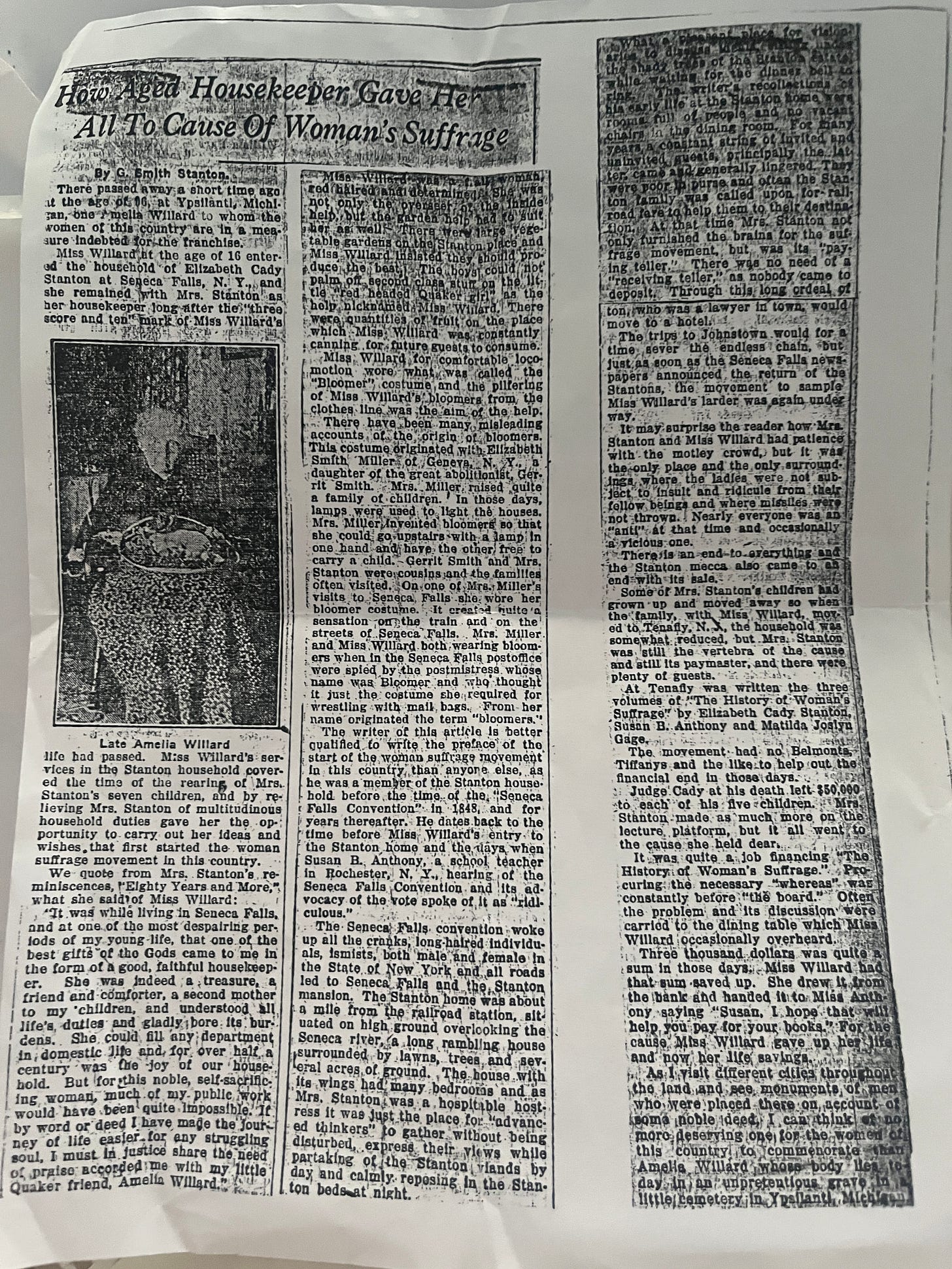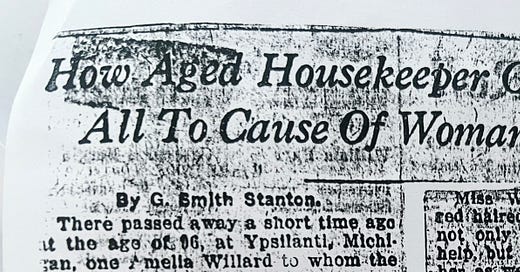I'd like to thank Amelia Willard
The woman behind the woman who led the fight for women's rights
It is eternally hard to balance home, motherhood and work—especially if your work is waging a revolution. One of the founding mothers and fearless leaders of the woman’s rights movement was Elizabeth Cady Stanton—and she did all that while raising seven children and keeping house without running water or electricity. She still managed to organize the Seneca Falls convention, write ferociously and fearlessly, tour the country giving speeches and organize many a political campaign for woman’s suffrage.
As I sit here in modern times, trying to do write with fewer than seven children and with running water, electricity and Wi-Fi, I still wonder: how on earth did she do it all?
She had help.
Her name was Amelia Willard.
In her biography, Elizabeth writes of her:
It was while living in Seneca Falls, and at one of the most despairing periods of my young life, that one of the best gifts of the Gods came to me in the form of a good, faithful housekeeper. She was indeed a treasure, a friend and comforter, a second mother to my children, and understood all life’s duties and gladly bore its burdens. She could fill any department in domestic life and for over half a century was the joy of our household. But for this noble, self-sacrificing woman, much of my public work would have been quite impossible. If it word or deed I have made the journey of life easier for any struggling soul, I must in justice share the need of praise accorded me with my little Quaker friend, Amelia Willard.
And thus, Amelia and Elizabeth were one of the greatest partnerships the world has never known.
Amelia wasn’t the only one helping around the Stanton house. Susan B. Anthony would come for extended stays and work the kitchen and mind the children so that Elizabeth could write. They too had a beautiful partnership. Elizabeth was the homebody thinker and writer, Susan was the traveler and organizer who took her words on the road. Together they kept house, raised the kids, wrote and delivered speeches. And then they would stay up late, sitting before the fire and “plotting the coming agitation.”
One reason Susan B. Anthony was able to become the leader of the movement and face of the 19th century feminism and women’s rights was because she didn’t have a husband, house or kids to slow her down. By choice! Susan never had a home of her own until her later years and then she had her sister Mary to keep house for her while she was almost always on the road. Susan said of her: "She has looked after the home and made it possible for me to do my work." The same could be said by Anna Howard Shaw, another important Suffragist leader, with whom Mary had a long (probably romantic) relationship. Women have rights today thanks to the work of Susan and Anna—work they could only do because of Mary.
But what about Amelia Willard? Her heroics in this story are not limited to cooking and cleaning. She stayed with Elizabeth and her family for decades. In all the suffrage books I read, I found little about who she was or her life. But then one summer day, as I was poking around in the Seneca Falls Historical Society (as one does), with the enthusiastic help of the women who worked there, we found an obituary of Miss Willard, written by one of Elizabeth’s sons, Gerrit.

Amelia was with Elizabeth’s family up until at least 1880s, when Elizabeth, Susan and Matilda Joslyn Gage were working on the Complete History of Woman’s Suffrage. The word for this book is enormous: it was an enormous undertaking to document a 72 year fight, it is literally an enormous collection of six enormous books that run about 1,000 pages each. There are flaws with this book, but without it, I’d wager that a lot of we know about the woman’s rights movement would be forgotten and lost for all time. Describing it as essential, vital or monumentally important is not an exaggeration.
But it was expensive to produce. Amelia kept house while Elizabeth, Susan and Matilda collaborated on this massive undertaking. She took care of meals, the clean up and the household so they could focus on their work. She also overheard their conversations at the dining table, where a regular topic was the need to fund the printing of the book and there just weren’t many women who could or would support the project. But Amelia Willard offered her life savings of three thousand dollars to get it done. Gerrit wrote, “For the cause Miss Willard gave up her life and now her life savings.”
The point is, no one gets anything done alone. Elizabeth would have always been the fearless thinker she was … but her words would have forever been stuck in her head had it not been for Amelia, giving her time to write. If not for Susan, who went out and delivered her speeches, which Susan could only do because she had a home kept by her sister Mary where she could return to recharge. There’s that phrase “behind every great man is a great woman” and it applies to women too.
Even though their names are rarely recorded and their work is rarely recognized, women like Amelia and Mary, who take on the time consuming and thankless work of housekeeping, make the world go round—in any era. They are the ones who make everything else possible. Their work should be valued and recognized.

To close out his loving tribute and obituary, Gerrit wrote,
“As I visit different cities throughout the land and see monuments of men who were placed there on account of some noble deed, I can of think of no more deserving one that for the women of this country to commemorate than Amelia Willard.”
To the Amelia Willards of the world—past, present and future—thank you.




What a wonderful tribute to one of the unsung heroines of the fight for women's rights.
This is beautiful!